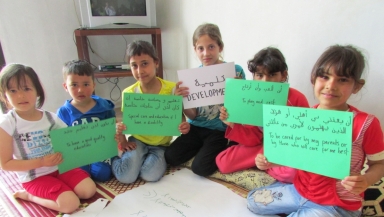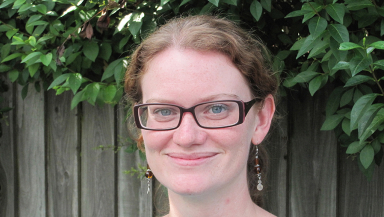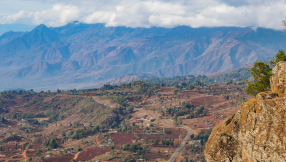
Children's charity Viva is partnering with two other agencies to increase support for millions of families caught up in the ongoing civil war in Syria.
Labelled by a Tearfund representative as "the biggest humanitarian crisis in decades", over 2.5 million people have fled Syria to neighbouring Turkey, Lebanon, Jordan and Iraq in the hopes of escaping escalating violence in the region since the outbreak of civil war three years ago.
Millions more have been displaced and the latest estimates from the UN High Commissioner for Refugees suggest that a shocking 9.5 million people are in need of aid while 100,000, including over 11,000 children, have been killed as a result of the conflict.
At least a dozen elementary school-aged children were among those who lost their lives in an airstrike in the northern city of Aleppo on 30 April.
"Far from getting better, the situation is getting worse," warned UN Under-Secretary General and Emergency Relief Coordinator Valerie Amos in statement yesterday.
"I am extremely concerned by the continued evidence of violations, by all parties, of the most fundamental provisions of human rights and humanitarian law," she added.
In addition, Viva reports that staggeringly, more than 1,000 children are crossing the border into Lebanon as refugees every day, and a total of 5.5 million children are affected. Aid organisations working in the region have repeatedly expressed concern about both the immediate and long-term effects that the ongoing crisis will have on Syrian children in particular, terming them the "lost generation".
Last December, Syrian political scientist Salem Kawakibi wrote a report detailing the ongoing repercussions of war on families across Syria, in which he argued that children often suffer the most, given their additional medical, nutritional, schooling and physiological needs.
"The main consequence of violent displacement is the disintegration of family structures," he asserted.
"Part of this relates to the increase in violence within families resulting from proximity, tensions, anxieties and the violence endured by adults. The experiences of displaced people and the management of humanitarian aid have created dynamics that will have unpredictable consequences for the country."

A report written and researched by 140 Syrian refugee children, commissioned by World Vision and released in March, also revealed that young people "live in constant fear that something will happen and affect our life or hurt us".
"We carry the weight of the world on our shoulders, but we do not complain because we don't want to overburden our parents," the children wrote.
"With all this, our fears grow day by day that the war will rage on, that destruction will intensify and that we will lose many of our friends and relatives who are still under fire in Syria. What we fear most is our uncertain future. We are afraid we may never go home and may be stranded far away from our country and home."
In response to these heartbreaking revelations, Viva has teamed up with Food for the Hungry and the Lebanese Society for Educational and Social Development (LSESD) to deliver training to those working with children on the ground in Syria.
Viva's Kezia M'Clelland has been conducting research and assessments on the impact of the war on Syrian children, and will now offer her expertise to members of the LSESD and their partners in the hopes of developing better systems of protection for those devastated by the violence.
"It's been really heartbreaking to hear stories of children who are being physically harmed by the war, suffering abuse, involved in child labour, missing out on school and struggling to cope with the experiences they have been through," Kezia says.
Her research has led her to uncover huge problems of sexual and physical abuse, and was told by a team member working in Syria that the psychological impact of war is also extensive.
"There are no longer any children in my country," the partner said.
"Even a four-year-old can tell you everything about the war."
Head of Network Development at Viva Brian Wilkinson says that different agencies working together will mean more children will receive vital help, which will offer them a better future.
"Disaster usually affects children the hardest. Our partnership with Food for the Hungry exchanges Viva's considerable expertise in child protection and child participation with the opportunity for us to gain valuable experience in emergency situations," he has said in a statement.
Kezia has also noted the integral role of the Church in meeting the needs of the local community across Syria. "In the face of this incredible need it is great to see the Church taking practical action, and it's a privilege for me to be able to be part of supporting LSESD."













